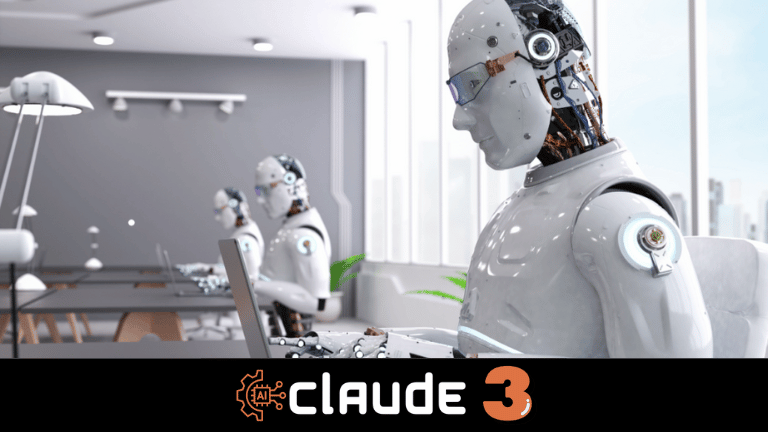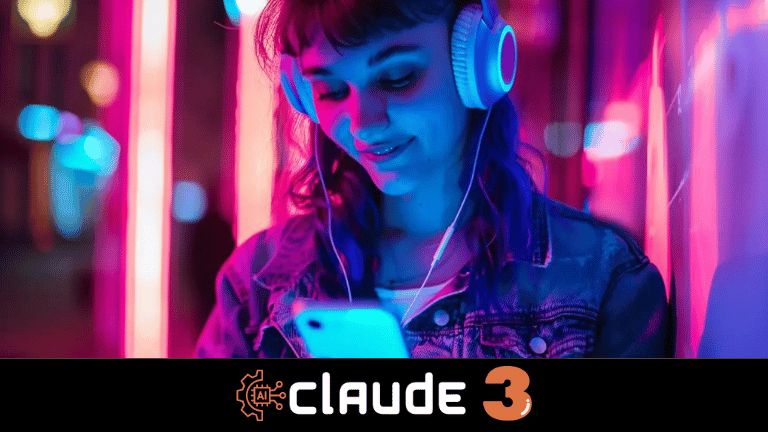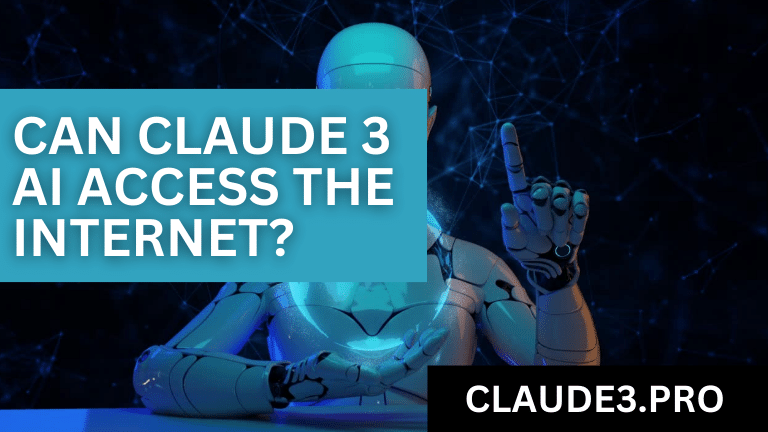Can Claude 3 AI Access the Internet? as with any advanced technology, questions arise regarding its limitations and potential safeguards. One such question that has piqued the interest of researchers, developers, and users alike is: Can Claude AI access the internet?
The ability to access the internet is a double-edged sword for AI systems like Claude. On one hand, access to the vast wealth of information and data available online could potentially enhance its knowledge base, enabling more accurate and up-to-date responses. On the other hand, unrestricted internet access raises significant concerns regarding privacy, security, and the potential misuse of such a powerful system.
In this comprehensive guide, we will delve into the intricacies of Claude AI’s internet connectivity, exploring the potential benefits, risks, and ethical considerations surrounding this issue. We will examine the current state of Claude AI’s internet access capabilities, the safeguards and limitations in place, and the ongoing debates within the AI community regarding the responsible development and deployment of such systems.
Understanding Claude AI’s Architecture and Training
Before diving into the specifics of Claude 3 AI’s internet access, it is crucial to understand the fundamental architecture and training processes that underpin this advanced language model.
The Transformer-Based Foundation
Like many state-of-the-art language models, Claude 3 AI is built upon the Transformer architecture, a groundbreaking neural network design that revolutionized the field of NLP. The Transformer architecture employs a self-attention mechanism, allowing the model to effectively capture long-range dependencies and contextual information within the input data.
This architectural foundation, combined with Claude AI’s massive scale and specialized training techniques, contributes to its remarkable language understanding and generation capabilities.
Pre-Training and Fine-Tuning
Claude AI, like many modern AI systems, undergoes a multi-stage training process that involves pre-training and fine-tuning. During the pre-training phase, the model is exposed to vast amounts of text data from various sources, allowing it to develop a broad understanding of language and acquire general knowledge.
Subsequently, Claude AI undergoes fine-tuning, where it is further trained on specific tasks or domains, enabling it to specialize and improve its performance in targeted areas, such as conversational interactions, content generation, or question answering.
The Role of Knowledge Bases
While the pre-training and fine-tuning processes imbue Claude AI with an extensive knowledge base, the question of whether this knowledge base is static or dynamic remains a crucial consideration in the context of internet access.
Static knowledge bases, derived from the training data, represent a snapshot in time and may become outdated or incomplete as new information emerges. Conversely, dynamic knowledge bases that can be updated or supplemented with information from the internet could potentially keep Claude AI’s knowledge current and relevant.
However, granting unfettered internet access to an AI system as powerful as Claude raises a multitude of concerns and ethical implications that must be carefully weighed and addressed.
Potential Benefits of Internet Access for Claude AI
While the risks and challenges associated with internet access for AI systems are significant, there are also potential benefits that warrant consideration. By exploring these benefits, we can gain a more balanced perspective on the debate surrounding Claude AI’s internet connectivity.
Enhancing Knowledge and Staying Current
One of the most apparent advantages of granting Claude AI internet access is the ability to enhance its knowledge base and stay current with the rapidly evolving world of information. The internet serves as a vast repository of constantly updating data, covering a wide range of topics from news and current events to scientific discoveries and technological advancements.
By accessing and incorporating this wealth of information, Claude AI could potentially provide more up-to-date and accurate responses, particularly in domains where knowledge rapidly evolves, such as politics, finance, or scientific research.
Improving Context Awareness and Relevance
The internet not only provides access to a vast array of information but also offers insights into cultural trends, regional nuances, and contextual factors that can enhance Claude AI’s ability to understand and generate relevant responses.
By analyzing online data sources like social media platforms, news outlets, and community forums, Claude AI could gain a deeper understanding of local contexts, idioms, and cultural references, enabling it to tailor its language and outputs to specific audiences or regions.
Enabling Real-Time Fact-Checking and Verification
One of the most significant challenges in the realm of natural language processing is ensuring the accuracy and truthfulness of the information generated by AI systems. With internet access, Claude AI could potentially incorporate fact-checking and verification capabilities, cross-referencing its responses against authoritative online sources to validate claims or correct inaccuracies.
This capability could be particularly valuable in domains where factual accuracy is paramount, such as journalism, scientific research, or legal contexts, enhancing the credibility and trustworthiness of Claude AI’s outputs.
Facilitating Dynamic Learning and Adaptation
Beyond simply accessing and incorporating information from the internet, granting Claude AI internet connectivity could enable dynamic learning and adaptation capabilities. By continuously ingesting and processing new data, Claude AI could potentially refine and update its language models, knowledge bases, and decision-making processes in real-time.
This dynamic learning capability could be particularly beneficial in rapidly evolving domains or scenarios where the AI system needs to adapt to changing conditions or requirements quickly.
Enabling Internet-Based Services and Applications
Finally, internet access could open up new possibilities for Claude AI to power internet-based services and applications. For instance, Claude AI could be integrated into web-based virtual assistants, chatbots, or search engines, leveraging its language understanding and generation capabilities in real-time to provide accurate and contextually relevant responses to user queries.
Additionally, Claude AI could potentially assist in web content creation, automated summarization, or language translation services, enabling more efficient and scalable solutions for businesses and organizations operating in the digital realm.

Risks and Ethical Considerations of Internet Access
While the potential benefits of granting Claude AI internet access are compelling, they must be carefully weighed against the significant risks and ethical considerations that arise from such a decision.
Privacy and Data Security Concerns
One of the most pressing concerns surrounding Claude AI’s internet access is the potential threat to individual privacy and data security. As a powerful language model, Claude AI could potentially access and process vast amounts of personal data and sensitive information available online, including social media profiles, financial records, or confidential documents.
This access raises significant concerns about the misuse of personal data, unauthorized surveillance, or the potential for data breaches and cyber attacks. Robust safeguards and strict protocols would need to be implemented to mitigate these risks and protect individual privacy rights.
Spread of Misinformation and Disinformation
The internet is a vast and often unregulated space, where misinformation, disinformation, and propaganda can spread rapidly. Granting Claude AI unfettered access to this environment could potentially exacerbate the problem of misinformation by inadvertently amplifying or propagating false or misleading information.
Even with fact-checking and verification mechanisms in place, the sheer volume and diversity of online content could make it challenging for Claude AI to reliably distinguish between truthful and deceptive information, particularly in rapidly evolving or highly polarized contexts.
Manipulation and Malicious Use
As an incredibly powerful language model, Claude AI could potentially be exploited for malicious purposes if granted internet access. Bad actors could attempt to manipulate or influence the AI system by feeding it carefully crafted data or prompts, potentially leading to the generation of harmful or deceptive content.
Furthermore, Claude AI’s internet access could be leveraged for cybercrime activities, such as phishing attacks, social engineering schemes, or the distribution of malware, posing significant security risks to individuals and organizations.
Ethical and Moral Implications
Beyond the technical risks, granting internet access to an AI system like Claude raises profound ethical and moral questions. As an AI system with the ability to access and process vast amounts of information, Claude AI could potentially encounter and be influenced by harmful or unethical content, such as hate speech, explicit material, or extremist ideologies.
This exposure could potentially shape the AI system’s behavior and outputs in undesirable ways, perpetuating biases, discrimination, or unethical viewpoints. Additionally, the ethical implications of an AI system accessing and processing personal or sensitive information without explicit consent must be carefully considered.
Regulatory and Legal Challenges
The concept of granting internet access to an AI system like Claude also introduces complex regulatory and legal challenges. Various jurisdictions have implemented laws and regulations governing data privacy, cybersecurity, and the responsible development and deployment of AI systems.
Ensuring compliance with these ever-evolving legal frameworks and navigating the potential cross-border implications of internet access would require significant effort and resources from the developers and operators of Claude AI.
Approaches to Responsible Internet Access for Claude AI
Given the potential benefits and risks associated with granting Claude AI internet access, a balanced and responsible approach is necessary to harness the advantages while mitigating the potential challenges and ethical concerns.
Controlled and Curated Access
One approach to responsible internet access for Claude AI is to implement a controlled and curated access model. Rather than allowing unrestricted access to the entire internet, Claude AI could be provided with access to a carefully curated set of online resources and data sources that have been vetted for accuracy, reliability, and appropriateness.
This curated access could be tailored to specific domains or use cases, ensuring that Claude AI receives relevant and trustworthy information while minimizing exposure to potentially harmful or undesirable content. The curation process could involve a combination of automated filtering techniques and human oversight to ensure the quality and integrity of the data sources.
Sandboxed and Monitored Environment
Another approach could involve operating Claude AI in a sandboxed and closely monitored environment when accessing the internet. A sandboxed environment isolates the AI system from the wider network and external systems, providing a controlled and secure environment for internet access and data processing.
Within this sandboxed environment, Claude AI’s internet activities could be closely monitored and logged, enabling real-time oversight and intervention if necessary. Advanced security measures, such as firewalls, intrusion detection systems, and access controls, could be implemented to prevent unauthorized access or data breaches.
Ethical Frameworks and Governance Models
To ensure the responsible development and deployment of Claude AI, especially in the context of internet access, it is crucial to establish robust ethical frameworks and governance models. These frameworks should be grounded in principles of transparency, accountability, fairness, and respect for human rights and privacy.
Ethical principles and guidelines could be developed in collaboration with multidisciplinary teams comprising AI researchers, ethicists, legal experts, and stakeholders from various sectors. These principles would guide the decision-making processes surrounding Claude AI’s internet access, data handling, and overall behavior, ensuring alignment with societal values and ethical norms.
Additionally, governance models could be established to oversee the implementation and adherence to these ethical frameworks. These models could involve independent oversight committees, external audits, and mechanisms for stakeholder engagement and public accountability.
Regulatory Collaboration and Compliance
As the development and deployment of AI systems like Claude AI have far-reaching implications, it is essential to collaborate with regulatory bodies and ensure compliance with relevant laws and regulations. This collaboration could involve working closely with data protection authorities, cybersecurity agencies, and industry-specific regulators to address concerns related to privacy, security, and responsible AI development.
By actively engaging with regulatory bodies and seeking their guidance, the developers and operators of Claude AI can ensure that their approach to internet access and data handling aligns with legal and regulatory requirements, fostering trust and confidence among stakeholders and the general public.
Continuous Monitoring, Evaluation, and Adaptation
Given the rapidly evolving nature of AI technology and the ever-changing landscape of the internet, a responsible approach to Claude AI’s internet access must involve continuous monitoring, evaluation, and adaptation.
Regular assessments should be conducted to evaluate the effectiveness of the implemented safeguards, the impact of internet access on Claude AI’s performance and outputs, and any emerging risks or ethical concerns. This evaluation process should involve input from diverse stakeholders, including AI researchers, domain experts, ethicists, and end-users.
Based on these evaluations, adjustments and refinements can be made to the internet access model, security measures, or ethical frameworks, ensuring that Claude AI’s internet connectivity remains aligned with evolving societal values, technological advancements, and regulatory developments.
Conclusion
The question of whether Claude AI can access the internet is a complex and multifaceted issue that requires careful consideration of the potential benefits, risks, and ethical implications. While internet access could potentially enhance Claude AI’s knowledge base, context awareness, and ability to provide accurate and relevant responses, it also introduces significant concerns related to privacy, security, the spread of misinformation, and potential misuse.
Ultimately, the decision to grant Claude AI internet access should be guided by a responsible and balanced approach that prioritizes ethical principles, robust safeguards, and continuous monitoring and adaptation. By fostering collaboration among AI developers, researchers, ethicists, regulators, and stakeholders, it is possible to harness the benefits of internet access for Claude AI while mitigating the associated risks and ensuring alignment with societal values and legal frameworks.
As AI technology continues to advance and become more integrated into our lives, addressing these complex issues proactively and transparently will be crucial for building trust, ensuring responsible development, and realizing the full potential of AI systems like Claude in a manner that benefits society as a whole.

FAQs
Can Claude 3 AI browse the internet?
No, Claude 3 AI cannot browse the internet. It operates within a controlled environment and does not have direct access to the internet.
Does Claude 3 AI use the internet to generate responses?
No, Claude 3 AI does not use the internet to generate responses. It generates text based on its training data and algorithms.
Can Claude 3 AI access real-time information from the internet?
No, Claude 3 AI cannot access real-time information from the internet. It relies on its training data to generate responses.
Does Claude 3 AI have access to external websites or databases?
No, Claude 3 AI does not have access to external websites or databases. It operates independently of external sources.
Can Claude 3 AI provide information from the internet?
No, Claude 3 AI cannot provide information from the internet. It can only generate text based on the information it has been trained on.
Is Claude 3 AI’s knowledge limited to its training data?
Yes, Claude 3 AI’s knowledge is limited to its training data. It does not have access to external information sources.
Can Claude 3 AI learn from new information on the internet?
No, Claude 3 AI cannot learn from new information on the internet. It can only be updated through retraining on new data.
Does Claude 3 AI’s lack of internet access affect its performance?
No, Claude 3 AI’s lack of internet access does not affect its performance. It is designed to operate independently of the internet.
Can Claude 3 AI be used for tasks that require internet access?
No, Claude 3 AI is not suitable for tasks that require real-time access to internet information.
How does Claude 3 AI handle queries that require internet-based information?
Claude 3 AI is designed to provide responses based on its training data and algorithms, so it may not be able to provide accurate information for queries that require internet-based information.
